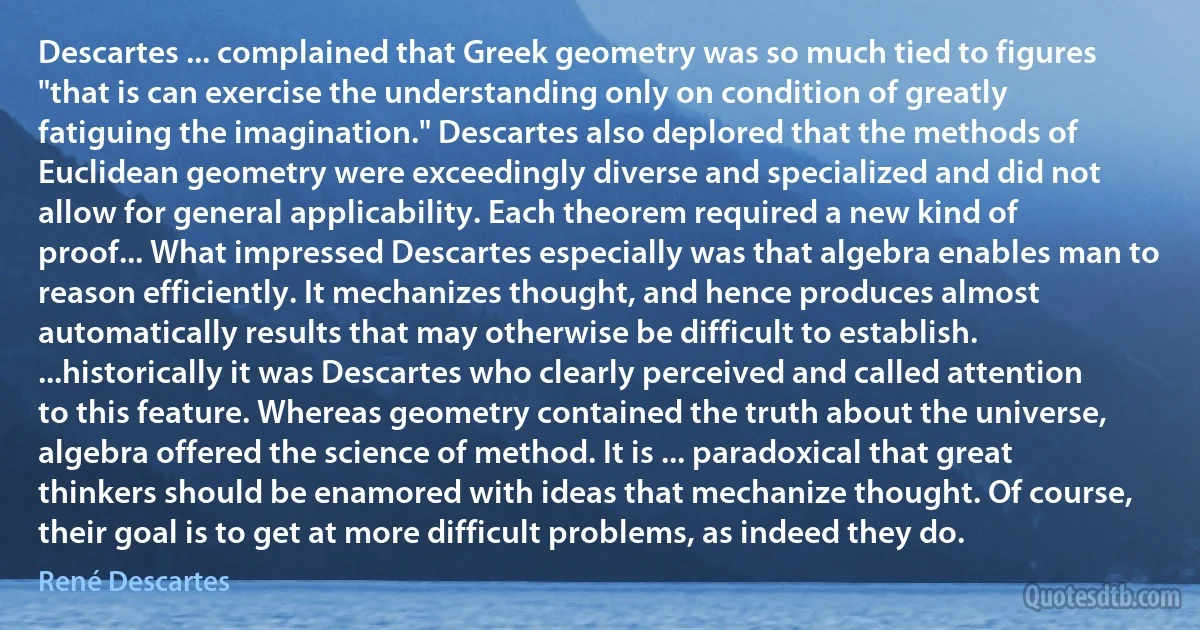
Descartes ... complained that Greek geometry was so much tied to figures "that is can exercise the understanding only on condition of greatly fatiguing the imagination." Descartes also deplored that the methods of Euclidean geometry were exceedingly diverse and specialized and did not allow for general applicability. Each theorem required a new kind of proof... What impressed Descartes especially was that algebra enables man to reason efficiently. It mechanizes thought, and hence produces almost automatically results that may otherwise be difficult to establish. ...historically it was Descartes who clearly perceived and called attention to this feature. Whereas geometry contained the truth about the universe, algebra offered the science of method. It is ... paradoxical that great thinkers should be enamored with ideas that mechanize thought. Of course, their goal is to get at more difficult problems, as indeed they do.
René DescartesRelated topics
algebra almost applicability attention condition course feature general geometry great kind man proof reason science should theorem thought truth understanding DescartesRelated quotes
More generally, the hidden variable account of a given system becomes entirely different when we remember that it has undoubtedly interacted with numerous other systems in the past and that the total wave function will certainly not be factorable. The same effect complicates the hidden variable account of the theory of measurement, when it is desired to include part of the 'apparatus' in the system. Bohm of course was well aware of these features of his scheme, and has given them much attention. However, it must be stressed that, to the present writer's knowledge, there is no proof that any hidden variable account of quantum mechanics must have this extraordinary character. It would therefore be interesting, perhaps, to pursue some further 'impossibility proofs,' replacing the arbitrary axioms objected to above by some condition of locality, or of separability of distant systems.

John Stewart Bell
[My] approach recognizes the basic principle of a written Constitution. We "the people" adopted a written Constitution precisely because it has a fixed meaning, a meaning that does not change. Otherwise we would have adopted the British approach of an unwritten, evolving constitution. Aside from amendment according to Article V, the Constitution's meaning cannot be updated, or changed, or altered by the Supreme Court, the Congress, or the President. Of course, even when strictly interpreted as I believe it should be, the Constitution remains a modern, "breathing" document as some like to call it, in the sense that the Court is constantly required to interpret how its provisions apply to the Constitutional questions of modern life. Nevertheless, strict interpretation must never surrender to the understandably attractive impulse towards creative but unwarranted alterations of first principles.

Clarence Thomas
In primitive society the rules of ceremonial purity observed by divine kings, chiefs, and priests agree in many respects with the rules observed by homicides, mourners, women in childbed, girls at puberty, hunters and fishermen, and so on. To us these various classes of persons appear to differ totally in character and condition; some of them we should call holy, others we might pronounce unclean and polluted. But the savage makes no such moral distinction between them; the conceptions of holiness and pollution are not yet differentiated in his mind. To him the common feature of all these persons is that they are dangerous and in danger, and the danger in which they stand and to which they expose others is what we should call spiritual or ghostly, and therefore imaginary. The danger, however, is not less real because it is imaginary; imagination acts upon man as really does gravitation, and may kill him as certainly as a dose of prussic acid.

James Frazer
We must grant the artist his subject, his idea, what the French call his donnée; our criticism is applied only to what he makes of it. Naturally I do not mean that we are bound to like it or find it interesting: in case we do not our course is perfectly simple - to let it alone. We may believe that of a certain idea even the most sincere novelist can make nothing at all, and the event may perfectly justify our belief; but the failure will have been a failure to execute, and it is in the execution that the fatal weakness is recorded. If we pretend to respect the artist at all we must allow him his freedom of choice, in the face, in particular cases, of innumerable presumptions that the choice will not fructify. Art derives a considerable part of its beneficial exercise from flying in the face of presumptions, and some of the most interesting experiments of which it is capable are hidden in the bosom of common things.

Henry James
Had it merely called to our attention the existence and exact nature of certain fundamental gaps in economic theory, the Theory of Economic Behavior by von Neumann and Morgenstern would have been a book of outstanding importance. But it does more than that. It is essentially constructive: where existing theory is considered to be inadequate, the authors put in its place a highly novel analytical apparatus designed to cope with the problem.
It would be doing the authors an injustice to say that theirs is a contribution to economics only. The scope of the book is much broader. The techniques applied by the authors in tackling economic problems are of sufficient generality to be valid in political science, sociology, or even military strategy. The applicability to games proper (chess and poker) is obvious from the title. Moreover, the book is of considerable interest from a purely mathematical point of view.

Leonid Hurwicz
